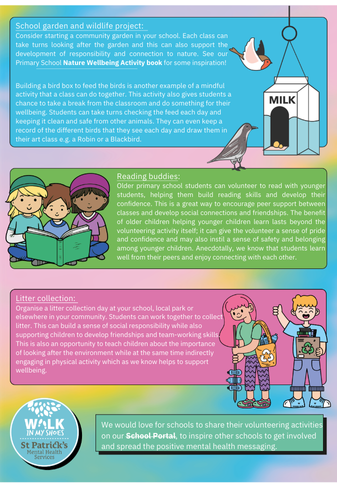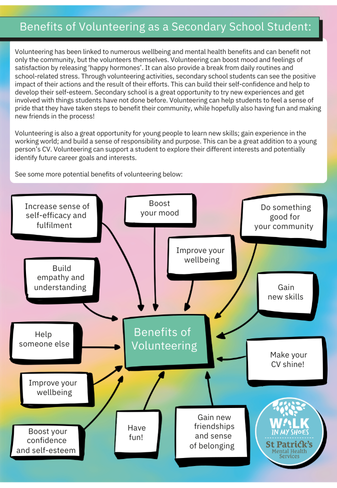
We are celebrating the positive wellbeing impact of volunteering with new resources for primary and secondary school students.
Volunteering has been linked to numerous wellbeing and health benefits and can make valuable contributions to classrooms, schools, homes, and communities - as well as for volunteers themselves.
To mark International Volunteering Day on 5 December 2024, Walk in My Shoes (WIMS) is releasing two new resources to encourage primary and secondary school students to volunteer.
What the resources cover
The resources are for children and young people of all ages and abilities.
From starting small with suggestions around reading buddies, litter collection or kindness bingo, the resources then also bring in ideas around school mentoring, sports coaching, or organising a charity event.
Through the resources, children and young people can learn about the benefits of volunteering their time, and ways to spread kindness, as well as developing new skills and boosting self-esteem.
How to enjoy the resources
We have two resource sheets which can be downloaded and enjoyed. The resources can be used with teachers during class time or at home with parents and guardians.
Primary school resource
The primary school resource teaches children about why volunteering is a wonderful opportunity for them to try something new and get involved with helping another person or their school community. It suggests age-appropriate activities that support a young person to build on their volunteering skills so that they can grow their confidence, develop empathy and sow the seeds of positive self-esteem.
Download the primary school resource here.
Secondary school resource
The secondary school resource aims to show how volunteering can help young people acquire new skills, gain practical experience in the workplace, and help foster a sense of responsibility and purpose. It also helps teach young people that engaging in positive activities can boost social connections and, in turn, help combat loneliness.
The resource is informed by young people themselves, as we asked students from our Transition Year Programme to suggest some volunteer activities, including The Mental Health Ambassador and Thought for the day, that are included in it.
Using the resources
These resources can be used in the classroom or at home. The activities can be discussed and completed during school time, given as homework, or shared with parents and guardians as a suggested after school or school holiday activity.
The resource can be explored with a discussion around the concept of volunteering, why we would volunteer and the benefits of using our time for others. They can also offer an opportunity to examine topics around positive mental health, self-worth and confidence, dealing with stress and feeling isolated or lonely.
How volunteering your time is beneficial
Volunteering can bring amazing benefits to a young person, and in turn, can benefit their school, community, and household. Some of these benefits include boosting moods and feelings of satisfaction, releasing “happy hormones”, and providing a break from daily routines and school-related stress. Volunteering can help reduce the stress that students may be feeling around academics or general worries young people are experiencing, as well as playing a part in building self-confidence and developing self-esteem, when children and young people see the positive impact of their actions and the result of their efforts.
Engaging in social connections is vital for the development of resilience and can prevent and reduce feelings of isolation and loneliness. Getting involved with a volunteering activity can encourage a child or young person to try something new and can help support the development of their social connections by growing their teamwork skills, developing friendships, and building a sense of shared goals and community. This can help a young person develop a sense of purpose and connection which offers an opportunity to combat feelings of isolation. Mental health services are seeing an increase in young people who are seeking support, many of whom are citing feelings of loneliness. Engaging in volunteer activities enables young people to build connections, learn about diverse experiences, and understand other people’s perspectives, all of which can help them to develop empathy.
Focussing on others can lead to a clearer head space, and help young people put their worries into perspective; a young person giving up their time can help create a positive impact in their community and seeing the impact of giving up their time to support others can help young people feel happier in themselves.
Volunteering can also contribute to a young person’s sense of pride when they have taken steps to benefit their community - and hopefully have had some fun and even made new friends in the process!
Sinead O’Kelly, Mental Health Promotion Manager at WIMS, says “volunteering provides children and young people with a unique opportunity to build connections, develop empathy, and gain a sense of purpose”.
“ By giving their time and energy to help others, they not only make a positive impact on their communities, but also enhance their own well-being, building resilience, confidence, and a stronger sense of self”.
“Experiencing positive emotion plays a crucial role in enhancing mental resilience and the ability to cope with negative experiences. Volunteering is a powerful way for young people to nurture both their mental health through enjoyment and positive emotion and their potential through personal development.”




